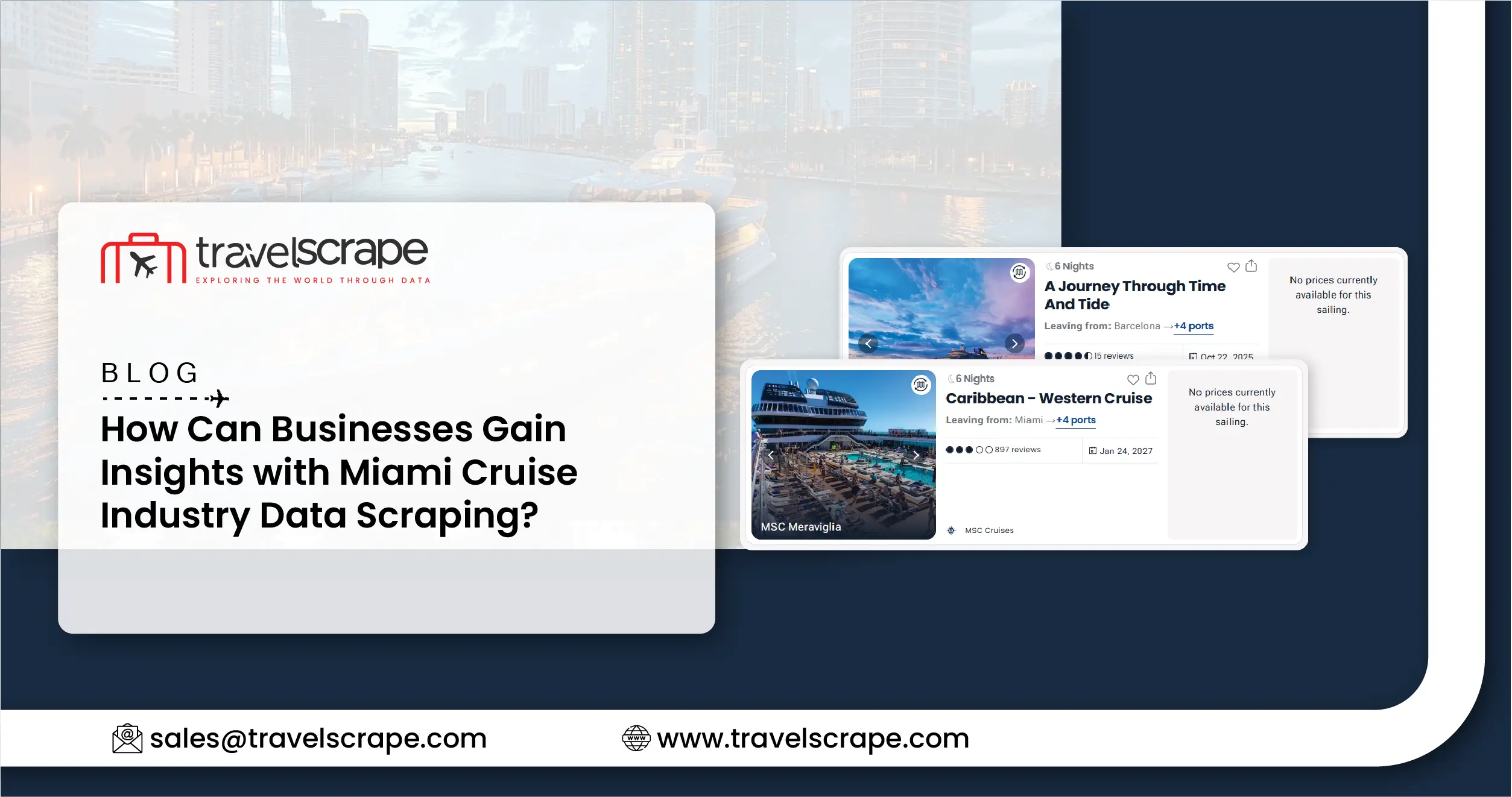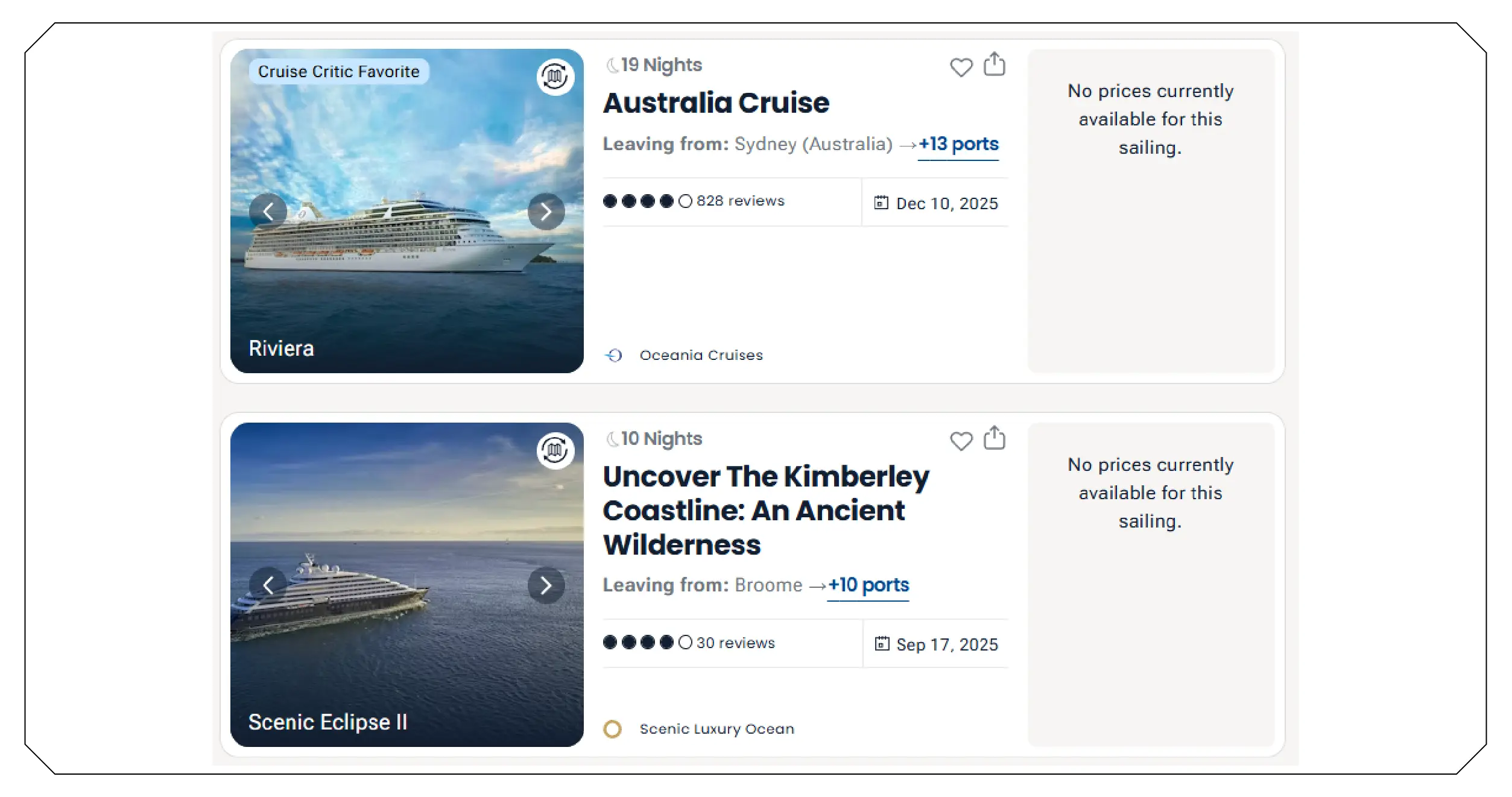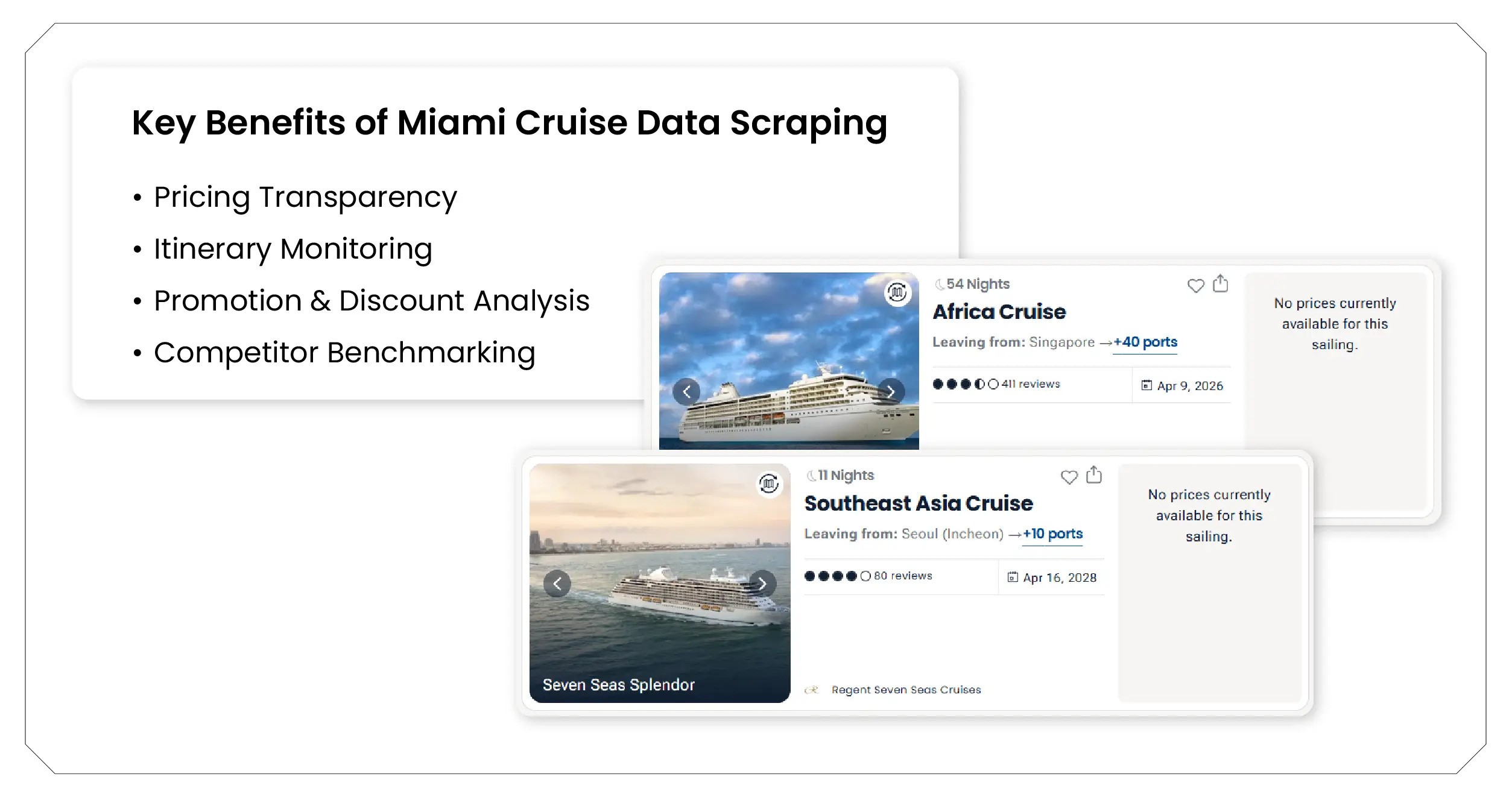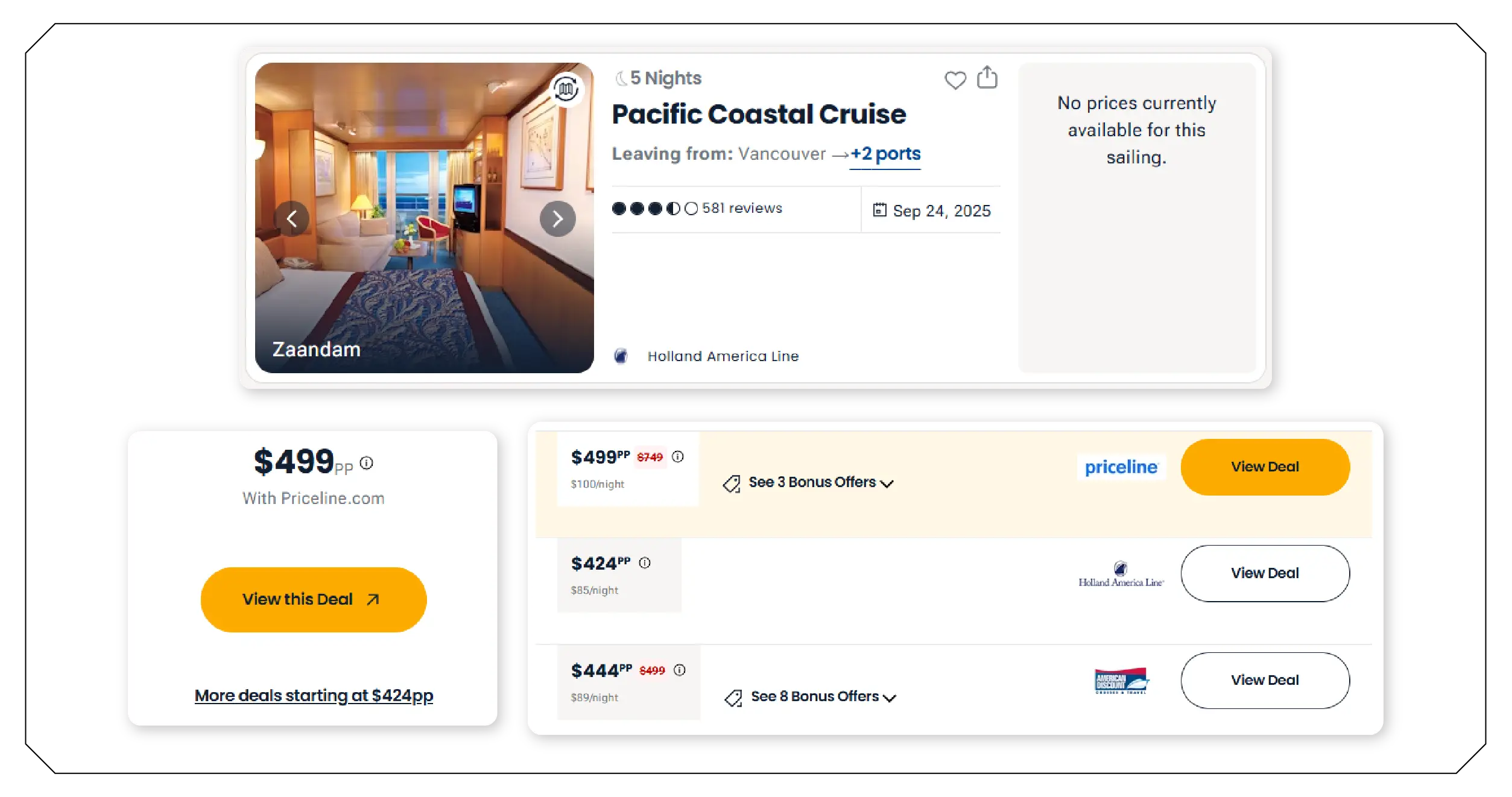How Can Businesses Gain Insights with Miami Cruise Industry Data Scraping?

Introduction
The cruise industry has always been a cornerstone of Miami's travel economy. Every year, millions of travelers board cruise ships from the bustling PortMiami, often referred to as the "Cruise Capital of the World." As competition intensifies between major players like Royal Caribbean, Carnival, and Celebrity Cruises, the need for accurate, real-time data has never been more critical. This is where Miami cruise industry data scraping becomes a powerful tool, providing businesses, agencies, and researchers with insights into pricing strategies, itineraries, and promotional campaigns.
The role of Cruise Itinerary Data Scraping extends far beyond basic fare monitoring. By collecting and analyzing structured data from cruise booking platforms, companies can track route changes, analyze port preferences, and uncover new market opportunities. For example, one of the most powerful applications of this technology is to scrape Royal Caribbean cruise data, which offers insights into voyage schedules, cabin pricing, and regional demand patterns across Miami-based departures.
In this blog, we'll explore how scraping technology is shaping the Miami cruise industry. We'll look at the major cruise operators—Royal Caribbean, Carnival Cruises, and Celebrity Cruises—and examine how data-driven insights give businesses a competitive advantage in understanding customer behavior, pricing intelligence, and itinerary management.
The Growing Demand for Cruise Data Scraping in Miami

Miami's cruise sector is one of the most competitive in the world. With multiple cruise lines offering overlapping routes to the Caribbean, Bahamas, and beyond, the challenge lies in differentiating offerings while staying competitive on price. That's where Carnival Cruises Miami data scraping becomes invaluable. By extracting real-time data from Carnival's booking platforms, companies can monitor how pricing fluctuates, how often promotions are offered, and which itineraries gain the most traction among travelers.
The rise of online booking channels has accelerated this demand. Today's travelers are more informed, comparing fares across platforms before making decisions. For businesses in travel tech, OTAs (online travel agencies), and cruise aggregators, investing in Cruise Pricing Intelligence ensures they don't just keep up with the competition, but stay one step ahead.
Why Cruise Data Matters in Miami's Travel Market?
Data scraping allows companies to decode customer preferences by observing trends in real time. For instance, Miami-based operators often test different promotional strategies. By tracking those through Celebrity Cruises Miami scraping insights, stakeholders can evaluate which discounts are most effective, how quickly cabins sell out at different price points, and which demographics are driving bookings.
The Miami market is also influenced heavily by seasonality. Summer months may see higher demand for family-friendly itineraries, while winter often attracts older travelers seeking Caribbean getaways. To identify these cycles, travel companies must Scrape Travel Competitor Data, enabling them to adjust their pricing strategies, forecast occupancy rates, and optimize marketing campaigns.
Key Benefits of Miami Cruise Data Scraping

Key benefits of Miami Cruise Data Scraping include real-time pricing insights, itinerary tracking, competitor benchmarking, and promotion analysis. These advantages empower travel agencies, cruise operators, and tech platforms to enhance decision-making, boost customer satisfaction, and remain competitive in Miami's cruise market.
1. Pricing Transparency
Cruise lines adjust prices based on demand, cabin availability, and booking lead times. With Miami cruise booking data scraping, businesses gain visibility into dynamic fare changes. This allows OTAs, tour operators, and analysts to predict market shifts better and create targeted offers.
2. Itinerary Monitoring
Tracking destinations is just as important as monitoring prices. By analyzing Cruise Industry Trends, agencies can see which Caribbean islands or ports are most frequently included in itineraries and spot emerging travel patterns. For example, increased stops in eco-tourism destinations might signal growing demand for sustainable travel.
3. Promotion & Discount Analysis
Cruise operators often run limited-time offers. Without scraping, businesses might miss out on understanding how these promotions impact booking velocity. Data scraping enables companies to uncover patterns in pricing and discount availability, thereby identifying optimal times for marketing pushes.
4. Competitor Benchmarking
Through competitor data collection, businesses can measure their performance against rivals. For example, scraping Royal Caribbean's premium suite cabin data against Carnival's family-oriented deals helps segment customers more effectively.
Case Study: Data Scraping Applications for Major Miami Cruise Lines
Royal Caribbean
Royal Caribbean is renowned for its innovation—whether it's massive ships with state-of-the-art amenities or unique itineraries. By using scraping tools to scrape Royal Caribbean cruise data, travel businesses can access structured insights into cabin pricing, trip duration, departure trends, and loyalty program benefits. This data empowers travel partners to optimize recommendations for high-value customers.
Carnival Cruises
Carnival focuses heavily on affordability and family-friendly experiences. With Carnival Cruises Miami data scraping, businesses can gather information on promotional packages, budget-friendly cabin deals, and themed voyages. This is particularly valuable for budget-conscious agencies trying to match customers with the best offers.
Celebrity Cruises
Celebrity Cruises targets the premium market, with upscale dining, luxury cabins, and curated itineraries. Leveraging Celebrity Cruises Miami scraping insights allows analysts to identify shifts in luxury demand, monitor premium package performance, and track exclusive offers that differentiate Celebrity from Carnival and Royal Caribbean.
How Travel Agencies Benefit from Cruise Data Scraping?

Travel agencies thrive on competitive advantage. By monitoring competitors and analyzing customer booking patterns, agencies can build strategies that align with traveler needs. For instance:
- Personalized Recommendations: Scraped data enables agencies to create itineraries tailored to customer interests, including adventure, family travel, or luxury.
- Dynamic Pricing Models: Agencies can create their own dynamic pricing tools by analyzing Cruise Pricing Intelligence trends from Miami.
- Marketing Optimization: With insights from promotions, agencies can time their campaigns to maximize engagement.
- Customer Retention: Agencies offering consistently competitive fares, based on scraped competitor data, maintain stronger customer loyalty.
Travel Tech Companies and Data-Driven Innovation
Beyond traditional travel agencies, technology companies are leveraging cruise scraping to build advanced platforms. These platforms integrate pricing, itinerary, and availability data into dashboards that provide end-to-end visibility for travel professionals.
For example, scraping tools focusing on Scrape Travel Competitor Data can provide real-time competitor comparisons. Integrating machine learning models with this data further enhances predictive accuracy, allowing companies to forecast demand surges, optimize marketing campaigns, and even adjust customer recommendations dynamically.
Cruise Industry Trends Driving the Demand for Data
One of the most significant applications of scraping technology is the ability to track Cruise Industry Trends. For Miami, these include:
- Sustainable Cruising: More ships are focusing on eco-friendly travel options. Data helps identify which itineraries highlight sustainability.
- Luxury vs. Budget Travel: A clear split is emerging between affordable Carnival cruises and premium Celebrity offerings. Scraping helps businesses cater to both markets effectively.
- New Ports & Routes: Companies can analyze which new ports are being added to itineraries and evaluate demand potential.
- Dynamic Demand Cycles: Seasonal demand fluctuations can be predicted by studying booking velocity and fare changes.
Data Challenges and Ethical Considerations
While scraping offers incredible benefits, companies must balance growth with compliance. Cruise operators may restrict access to certain types of data, and businesses must ensure they operate within legal and ethical boundaries.
Best practices include:
- Focusing on publicly available data.
- Respecting website terms of service.
- Using scraping responsibly to avoid server overload.
When done ethically, cruise data scraping drives innovation without harming operators' digital infrastructure.
Future of Cruise Data Analytics in Miami

As digital transformation accelerates, cruise lines are increasingly relying on data for strategic planning. Scraping enables integration of multiple data points—pricing, itineraries, promotions—into comprehensive intelligence platforms. These insights allow businesses to anticipate traveler expectations and make better decisions.
For example, integrating scraped data with customer analytics can help create predictive booking models. Travel companies will soon be able to forecast demand not just by season, but by traveler type, region, and even cabin preference.
How Travel Scrape Can Help You?
- Real-Time Pricing Intelligence – We extract live fare updates from major cruise lines to track pricing fluctuations and promotional trends.
- Itinerary & Route Monitoring – Our solutions collect cruise schedules, destinations, and port data to identify popular routes and seasonal travel shifts.
- Competitor Benchmarking – We provide structured competitor insights by analyzing offers from Royal Caribbean, Carnival, and Celebrity Cruises.
- Promotion & Discount Tracking – Our scraping tools capture limited-time offers, helping agencies align campaigns with market demand.
- Custom API Integration – We deliver cruise data via APIs, enabling seamless integration into travel dashboards, booking platforms, and analytics systems.
Conclusion
In today's highly competitive environment, data is not just valuable—it is essential. From Royal Caribbean to Carnival and Celebrity Cruises, each operator leverages digital platforms to attract travelers. Businesses that invest in scraping tools gain insights that allow them to differentiate their services, optimize pricing, and enhance customer satisfaction. By monitoring itineraries, promotions, and pricing structures, travel professionals stay ahead in a market defined by constant change. This includes identifying opportunities in scraping Miami cruise deals and promotional offers, where competitive analysis drives sales conversions. Similarly, advancements in Real-Time Travel Fare Scraping Grew Cruise provide deeper visibility into fare fluctuations, ensuring agencies can offer the most competitive packages. Looking ahead, demand for Miami cruise itinerary scraping for travel agencies will continue to rise. With data becoming the backbone of travel decision-making, Miami's cruise industry will remain a focal point for innovation, competition, and traveler satisfaction.
Ready to elevate your travel business with cutting-edge data insights? Get in touch with Travel Scrape today to explore how our end-to-end data solutions can uncover new revenue streams, enhance your offerings, and strengthen your competitive edge in the travel market.